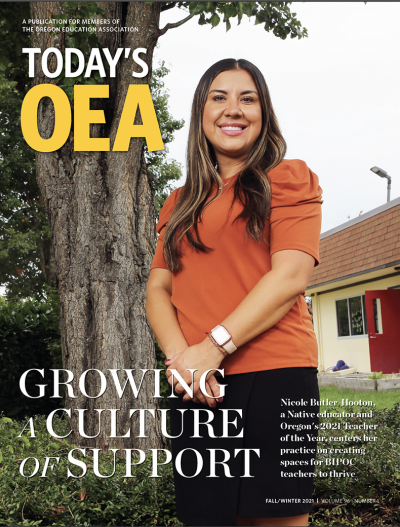The 2019 OEA Representative Assembly could not have come at a more challenging, emotional, or exciting time for Oregon educators. Fresh from the great success of the March for Our Students event on February 18, and just days before the monumental statewide actions held on May 8, OEA members were in fighting shape as they gathered to shape the work of the OEA for the coming year. Of the 43 New Business Items (NBIs) submitted at this year’s assembly, 24 were passed, and many others referred to the OEA Board.
The spirit of debate was alive and well in our members this year! The discussion of NBIs went late into the evening on Saturday, and it was clear that our members came to fight for the education issues they hold dear.
Over 600 delegates attended the 2019 OEA Representative Assembly. All gathered on Friday evening to adopt their standing rules, receive reports, and hear candidate speeches, going late into the evening. On Saturday, delegates voted to elect officers to serve as OEA President, OEA Vice President, one NEA Director, a Racial Equity Director, and an at-large ESP Director.
Also on Saturday, delegates debated and adopted new business items and amendments to OEA’s Bylaws, Policies, Resolutions, and Legislative Objectives. Refer to the 2019 OEA RA Minutes for full details on debate: oregoned.org/ra.
ELECTION RESULTS
Serving a two-year term beginning July 10, 2019:
- John Larson, President
- Reed Scott-Schwalbach, Vice President
Serving a three-year term:
Beginning September 1, 2019
- Enrique Farrera, NEA Director
Beginning July 10, 2019
- Thyunga Barr, Racial Equity Director
- Tim Willett, at large ESP Director
HONORING OEA MEMBERS & PUBLIC EDUCATION ALLIES
Dick Barss/Pat Wohlers Member Rights Award
Sue McGrory, Greater Albany Education Association
Noel Connall IPD Award
Aly Nester, Springfield Education Association
Robert G. Crumpton Organizational Excellence Award
Karen Lally, Beaverton Education Association
Excellence in Education Award
Leah Dunbar, Eugene Education Association
Political Action Award
Suzanne Cohen, Portland Association of Teachers
Kevin Forney Education Support Professional Award
Amanda O’Sullivan, Eagle Point Education Association
Ruth E. Greiner Membership Award
Sara Schmitt, Beaverton Education Association
OEA Retired Lifetime Service Award
Nancy Lewis, OEA-Retired
Ed Elliot Human Rights Award
Paula Dennis, Portland Association of Teachers
PRESIDENTIAL CITATIONS
2019 Oregon Teacher of the Year
Keri Ricker Pilgrim, Eugene Education Association
2019 Friend of the Foundation
Betty Tumlin, OEA-Retired
OEA Leadership Award
Forest Schoner, Rogue River Education Association
Maureen Lundy, Klamath Falls Education Association
OEA Advocacy Award
Susie Jones, Multnomah Educational Service District Board of Directors
OEA Organizing Award
Erika Breton, Woodburn Education Association
Joe Crafton, McMinnville Education Association
OEA Political Action Award
Tina Leaton, Eugene Education Association
Lisa North, Medford Education Association
Troy Pomeroy, Medford Education Association
OEA Social Justice Award
Lisa Piscitello, Brookings-Harbor Education Association
Mickey Laney-Jarvis, Grants Pass Education Association
Nichole Watson, Portland Association of Teachers
APPROVED BY THE DELEGATION
1. Use the winners of the Kevin Forney ESP of the Year and the Willie Juhola ESP of the Year for Speaking Engagements throughout the year in which they are the winner. The Kevin Forney award winner should speak at the OEA RA. Other examples of this would be the Summer Leadership Conference and OEA Symposium.
2. Look into having an Oregon Support Education license plate.
3. Promote Public Service Loan Forgiveness Program (and the related Temporary Expanded PSLF Program) by highlighting who is eligible, the fact that less than 1% of applications have been approved, and the tools and resources available to assist educators in successfully navigating the process in all appropriate print and existing digital-media formats.
8. Create a task force to collect and share best practices for how school communities can respond to traumatic events on or near campuses for members and students with local EAs, COSA, OSBA, NEA, and other stakeholders.
9. Whenever OEA communicates support for legislation, and that legislation is incremental and falls short of the OEA Legislative objectives, all such communication should include both:
- praise for the lawmakers, praise for what we support and why;
- educational language as to why a gap remains and how we propose that gap be addressed.
10. Assign appropriate staff from GPS & Public Affairs to partner with existing organizations to support the professional development, training, and curriculum needs of educators related to sex education. OEA GPS and lobbying staff will work in line with legislative objectives regarding student health and safety, to advocate for the necessary resources for educators to support implementation of Oregon’s sex education standards.
11. Create a task force to examine the state of social studies instruction (K-12) in Oregon. The task force will write a report, including recommendations, that will be delivered to the 2020 Rep. Assembly. Some topics to be considered:
- Equity of time compared with other core subjects
- Help for S.S. teachers in teaching new standards and seeking approved resources that match state standards.
14. Study and make recommendations for action steps, trainings, and other avenues to resolve issues facing our transgender, non-binary and questioning students and members.
15. The Center for Great Public Schools shall identify best practice standards for dual language immersion curriculum and to identify standards of performance evaluation for dual language immersion educators in order to make recommendations to the Oregon Department of Education.
16. Encourage the practice of including a person’s gender pronouns on printed documents that identify members represent our core values of identity inclusivity by normalizing the recognition of gender pronouns on badges, name tags, office signage and other delegate documents. The OEA will encourage members
to identify their gender pronouns when they are introducing themselves on the floor of RA, in recognition of our core values of identity inclusivity.
17. Partner with rank and file members and utilize the expertise of Oregon Center for Public Policy (OCPP) and Tax Fairness Oregon to educate members about corporations and top earners. An emphasis will be on tax evasions and loopholes, profits, income inequality, progressive versus regressive taxes, and the history of tax rates and how it affects funding for social services and the quality of life for Oregonians. Education will include written materials distributed to every local so all members have access to the information, online resources and holding support workshops at local UniServs and union halls.
19. Instruct the Bylaws and Policies committee working with Center for Great Public Schools explore options for engaging student voice by establishing a high school student program.
20. Investigate the TAG testing procedures across the state, specifically with ELL students and students of color, and report out and make recommendations, that are equitable for all students.
21. OEA Special Education Committee shall explore and subsequently advocate for including class size data in the referral process for special education.
23. Support and endorse HB2015 which eliminates the requirement that person provide proof of legal presence before Department of Transportation issues non-commercial drivers licenses, non-commercial driver permit or identification cards and that we support and endorse the entire Fair Shot for All agenda.
24. Use existing communication channels including OEA magazine, social media, press releases, lobbying efforts, etc. to educate people on the loss of, importance of, and need to restore teacher librarians at our schools.
25. Engage in a public relations campaign using primarily social media, that focuses on preemptive and timely messaging to the general public about those attacking public education (such as the Koch Brothers), the corporate disinvestment in public education, and the overarching intention to privatize public education.
26. Update current language throughout all OEA documents to recognize institutional racism in education — the subtle but entrenched policies & practices within schools that have a disproportionately negative impact on students and staff of color. And I further move that OEA committees coordinate with the EMAC and HCRC to update current language.
27. Demand that the 2020 legislature add an additional $2 billion in revenue-raising measures above what is called for in the Student Success Act, to be used for pre-K through post-high school public education.
31. Advocate for the most progressive structure to raise additional revenue for public education and other public services
35. Oppose any Oregon Department of Education requirement that students must pass a single high stakes assessment in order to exit English Language Development Services, without the option for an educational portfolio review as an alternative for exit. The OEA will investigate the cause for the sudden exclusion for the exit portfolio option and demand that the state work towards re-instituting alternative options for ELD program exit.
36. Assign appropriate staff from the Center for Great Public Schools to reach out to organizations that have demonstrated expertise in eliminating disproportionate discipline in community organizations that represent those students most affected by the circumstances that create trauma in children. OEA will work with these organizations as we create action plans from the Disrupted Learning Report.
43. Gather information from local leaders about district responses to the May 8th walkout and provide a report about the various responses to its members.

